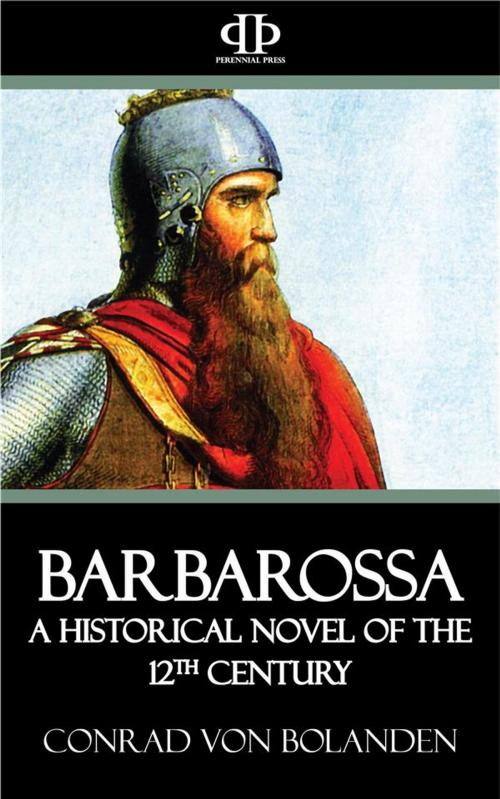Barbarossa
A Historical Novel of the 12th Century
Fiction & Literature, Military, Romance, Historical| Author: | Conrad von Bolanden | ISBN: | 9781531238964 |
| Publisher: | Perennial Press | Publication: | February 28, 2016 |
| Imprint: | Language: | English |
| Author: | Conrad von Bolanden |
| ISBN: | 9781531238964 |
| Publisher: | Perennial Press |
| Publication: | February 28, 2016 |
| Imprint: | |
| Language: | English |
The pleasant historical novel which is now offered to the American public, refers to a period of history very much misrepresented, though very frequently written about, or at least referred to by popular writers. In the contest between Pope Alexander III. and the Emperor Frederic Barbarossa, we see a very important phase of the long struggle between the spiritual and civil power; a struggle, in which was fought the battle of real liberty, and real Christian civilization, against brute force and Pagan tyranny. Perhaps nothing has been so badly understood as the real asus belli in this struggle of centuries. Most non-Catholics firmly believe that the conflict arose from an effort of the Church to obtain universal dominion; to make princes and people bow to her behests on all matters; to reduce the civil ruler to the condition of a mere lieutenant of the Pontiff, to be removed at will by that spiritual autocrat, and, of course, to improve the condition of her own officials; securing for them the choicest and fairest portions of all the good things of the earth. The Emperors and Kings who were hostile to the Church are painted, on the other hand, as the assertors of civil liberty, the William Tells that refused to salute the tyrant's cap, even though it were called a tiara; the heroes, that in a superstitious age braved the terrors of excommunication, rather than sink into a degraded servitude, to the heartless ambition of churchmen.
Nothing can be farther from the truth than this view of the subject. In reality, what the Church fought for during this long struggle was--not power, but--liberty. She refused to admit that she was a corporation existing by the permission, or the creation of the State. She claimed to be a spiritual society, existing by the fiat of the will of God, entirely independent in her own sphere, having a government of her own; executive, legislative, and judicial rights and duties of her own; an end of her own, far above and beyond the affairs of this world. It was for this liberty and independence that her martyrs had died, her confessors languished in prison, her saints prayed and suffered. When the rulers of the world became Christian, the difficulties in the way of her liberty did not cease; they only assumed a new form. Open opposition became oppression, under the specious name of protection; and the State made every effort to restrain and shackle a power, the indomitable energy and dauntless courage of which it imagined it had reason to fear...
The pleasant historical novel which is now offered to the American public, refers to a period of history very much misrepresented, though very frequently written about, or at least referred to by popular writers. In the contest between Pope Alexander III. and the Emperor Frederic Barbarossa, we see a very important phase of the long struggle between the spiritual and civil power; a struggle, in which was fought the battle of real liberty, and real Christian civilization, against brute force and Pagan tyranny. Perhaps nothing has been so badly understood as the real asus belli in this struggle of centuries. Most non-Catholics firmly believe that the conflict arose from an effort of the Church to obtain universal dominion; to make princes and people bow to her behests on all matters; to reduce the civil ruler to the condition of a mere lieutenant of the Pontiff, to be removed at will by that spiritual autocrat, and, of course, to improve the condition of her own officials; securing for them the choicest and fairest portions of all the good things of the earth. The Emperors and Kings who were hostile to the Church are painted, on the other hand, as the assertors of civil liberty, the William Tells that refused to salute the tyrant's cap, even though it were called a tiara; the heroes, that in a superstitious age braved the terrors of excommunication, rather than sink into a degraded servitude, to the heartless ambition of churchmen.
Nothing can be farther from the truth than this view of the subject. In reality, what the Church fought for during this long struggle was--not power, but--liberty. She refused to admit that she was a corporation existing by the permission, or the creation of the State. She claimed to be a spiritual society, existing by the fiat of the will of God, entirely independent in her own sphere, having a government of her own; executive, legislative, and judicial rights and duties of her own; an end of her own, far above and beyond the affairs of this world. It was for this liberty and independence that her martyrs had died, her confessors languished in prison, her saints prayed and suffered. When the rulers of the world became Christian, the difficulties in the way of her liberty did not cease; they only assumed a new form. Open opposition became oppression, under the specious name of protection; and the State made every effort to restrain and shackle a power, the indomitable energy and dauntless courage of which it imagined it had reason to fear...















